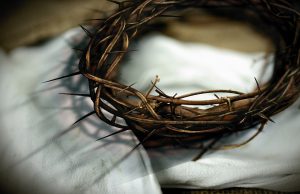The Subversive Shape of Power
Chris+ Myers
 “And over his head they put the charge against him, which read, ‘This is Jesus, the King of the Jews.” Matt. 27:37
“And over his head they put the charge against him, which read, ‘This is Jesus, the King of the Jews.” Matt. 27:37
“When the centurion and those who were with him, keeping watch over Jesus, saw the earthquake and what took place, they were filled with awe and said, “Truly this was the Son of God!” Matt. 27:54
On the day we call Good Friday, Jesus found himself caught between the imperial power of Rome and the dashed expectations of the Jewish people. When Jesus had ridden into Jerusalem just days before, the Jews thought they were ushering in the political reign of their rightful king. But Jesus had come to die, to ascend a cross, not a throne. In this context, the charge Rome made against Jesus reads like a cynical jab at the Jews, a reminder that they were a conquered and subjected people. It was Rome’s way of saying, “Look what we do to so-called kings.” But like those in the crowd who cried out for the Jesus’ blood to be on them and their children, the Romans were saying more than they knew.
For Rome there was one king, one they called son of god and that was Caesar. But for the Jews, their hope and expectation was that a Son of David would reign not only over Israel, but over the whole world. Indeed, throughout the Old Testament there is an unfulfilled thread of promise that the king of Israel would be king of the world. We see it first in Genesis 49 when Jacob blesses his sons and says of Judah, “The scepter shall not depart from Judah, nor the ruler’s staff from between his feet, until tribute comes to him; and to him shall be the obedience of the peoples” (Gen. 49:10). This theme finds particular focus in the house of David and the promise that his sons will rule forever (2 Sam. 7) and is poetically expressed throughout the Psalms, particularly in Psalm 2 and Psalm 72.
It was no wonder the Jews expected Jesus to ascend a throne. But his path to the throne was by way of the cross, and it is on the cross that we behold the true kingship of Jesus, the one who willingly lays down his life and who willingly will take it up again. The one who could have called legions of angels to vanquish the legions of Rome, but who instead offered himself up by turning the other cheek, becoming in his death the truly meek one who would inherit the earth.
With all of this in mind, think of what it means for a Roman centurion, a soldier under the charge of Caesar, the one called son of god, a soldier trained in the art of war and execution, a soldier who exercised and enforced the power of Rome, to say, “Truly this was the Son of God!” (Matt. 27:54). He sees the sky darkened, feels the earth shake, hears as Jesus offers up his spirit, and responds, “This one is the Son of God,” essentially saying, “I have just witnessed true power.” What the centurion recognizes that there is more to power than the raw flexing of imperial might. He is able to glimpse in part what the Jews had hoped to see in Jesus on Palm Sunday—that this man was truly King of the Jews.
As you meditate on the death of Christ this Good Friday, ask God to show you the shape of true kingship and power in the face of Christ, and pray that your confession would be the centurion’s confession, “Truly this was the Son of God.”

Chris Myers serves as the Associate Rector of St. Bartholomew’s Anglican. He graduated from Redeemer Seminary with an M.Div. in 2013 and was ordained as a priest in the Anglican Mission in May of 2015. He is currently doing doctoral work in theology at Durham University (UK). He and his wife Morgan have two delightful daughters, Eleanor and Rowan.
Category: Celebrate, Spiritual Growth
Tags: Church Calendar, Church year, Good Friday, Psalm 2, Psalm 72, Text










